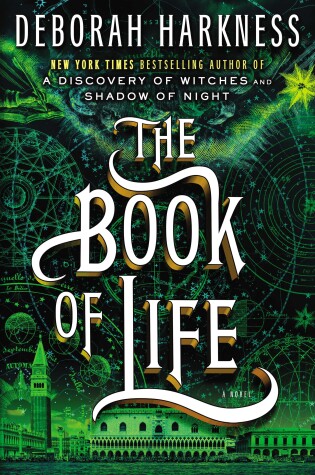The Book of Life was not as bad as Shadow of Night, but it was still absolutely dull and insipid. It starts off with two characters who could be an interesting addition but never appear again throughout the book except as passing mentions from other characters, and a new character is mentioned in the very last pages of the series! The pacing was just all wrong. This whole series should have been interesting and exciting, but it was just boring, with a plodding plot, and nonsensical worldbuilding. I honestly don’t understand what people see in these books.
“Vote?” Matthew said, incredulous. “Since when did we vote in this family?” “Since Marcus took over the Knights of Lazarus,” Gallowglass replied, drawing a silver lighter from his pocket. “We’ve been choking on democracy since the day you left.”By this book, it seems that Harkness had realised that first person wasn’t really working for her writing style, and so The Book of Life is filled with switching points of view. We still get Diana’s utterly insipid narration, but now we also switch to an omniscient narrator to talk about all the other characters. Including dead ones! Because of the inclusion of characters who had been killed off in previous books, the whole thing felt bloated with unnecessary voices and personalities. Characters who had no appearance in the last book suddenly popped up again and were apparently necessary, and characters who had only briefly been introduced for a page or two during the last book all of a sudden became central characters. There was no development and no reason for me to care about any of these characters in the slightest.
The worldbuilding was practically non-existent. From the beginning of the series, we’re told that it’s incredibly important to keep humans in the dark about the existence of creatures, and secrecy is paramount. But within the first few pages, Diana and Matthew are telling absolutely everyone about everything while still maintaining that it has to be a secret. The time travel element of the previous book also wholly failed in The Book of Life. There are suggestions that Diana and Matthew changed the past with new historical artefacts appearing, however, given that the characters of the book who were alive in the past all had memories of Diana and Matthew being there, this shows that the past simply became the past. There would have been no changes appearing in the present, as the past was one that had already happened, meaning those artefacts would simply have already existed in the historical record. No thought went into the internal logic of this book at all!
From a character point of view, Diana’s job is to be pregnant, Matthew’s job is to be an overprotective asshole (but he’s apparently an asshole for medical reasons, so that’s ok?). And don’t even get me started on the absolutely unnecessary and unbelievable love triangle that exists solely to show what a special flower Diana is. (Although I must say that there was more connection in the two paragraphs Diana spent on the unrequited love than there was in a single page of her romance with Matthew).
“I watched in silence as the parts of Matthew I knew and loved—the poet and the scientist, the warrior and the spy, the Renaissance prince and the father—fell away until only the darkest, most forbidding part of him remained. He was only the assassin now. But he was still the man I loved.”Then we come to the central premise of the whole series. Ashmole 782. I nearly smashed my kindle, throwing it across the airport when I came to the culmination of searching for that blasted book. The search for the book should have been the primary plot point, but it always ran second to Diana and Matthew’s romance for the entire series, but to have it culminate in such a completely unoriginal, and idiotic way just made me rage. I can’t talk about it without spoiling it, but suffice to say it was awful.
Honestly, I could go into detail about the meandering plot (full of plot holes), the utterly contrived romance, the weak characterisation, and lacklustre worldbuilding, but I’d be here all day. Suffice it to say, I just don’t understand why people love these books. I could forgive the plot holes and poorly conceived character arcs if it were a fun read. But it wasn’t. It was just boring. If you like your men abusive, and your women pregnant and submissive, then this might be the series for you. But if you want more out of your reading material, I’d recommend you read just about anything else.

